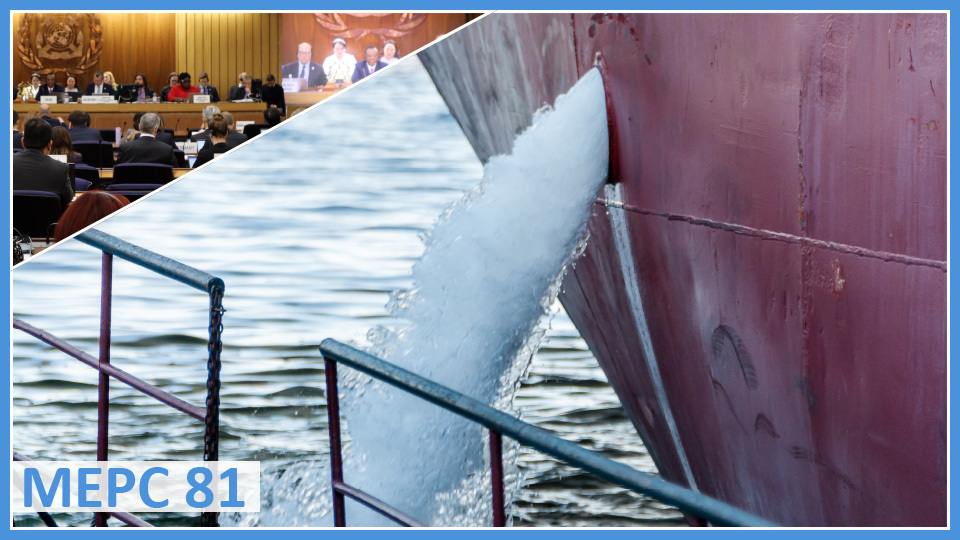
CONTACT BIMCO
Ashok Srinivasan
Manager, Maritime Safety & Security
Singapore, Singapore
- +65 9144 3404
- hsse@bimco.org

MEPC 81 addressed ballast water management for ships while operating in challenging water quality, and temporary storage of treated sewage and/or grey water in ballast water tanks.
The recent meeting of the IMO’s Marine Environmental Protection Committee (81st Session) made significant progress on the application of the BWM Convention to ships operating in challenging water quality conditions, and on temporary storage of treated sewage and/or grey water in ballast water tanks – with guidance adopted on both issues.
Two important items related to Ballast Water Management were finalised at MEPC 81. They were:
Ships often find it challenging to operate in ports where the ambient uptake water has certain features such as high total suspended solids, or turbidity, which may cause a properly installed, maintained and operated type-approved ballast water management system (BWMS) to be temporarily inoperable.
The main issue with such challenging water quality (CWQ) is that it hinders the effectiveness of ballast water treatment systems (BWTS) ultimately meaning that organisms like harmful microbes and invasive species could be discharged in ballast water, posing a threat to marine ecosystems. Ports with high levels of sediment, algae, or organisms can overload BWTS filters, reducing efficiency or causing them to malfunction. Ships may need to slow down operations or take alternative measures to comply with regulations, leading to time and money being lost.
MEPC 80 recognised the critical importance of this issue and the need to address it with a proper guidance. BIMCO worked with several member states and international organisations intersessionally between MEPC 80 and 81 to arrive at a compromised draft guidance text.
At MEPC 81, after several rounds of discussion in the working group (including 3 rounds of votes) the text in the interim guidance was approved.
We hope that shipowners will find this interim guidance useful when trying to manage challenging water quality in ports.
On the subject of challenging water quality, INTERTANKO, has collected information on ports with challenging water quality and subsequently developed a database. This will be open to all interested stakeholders in order that they might benefit from this valuable resource. This database provides a reference tool which includes both well-known and less commonly known CWQ locations. Utilising the CWQ database information will enhance shipowners' ability to identify specific locations where ships should not uptake ballast water. Shipowners and operators can also use this database to better plan their voyages - keeping the challenges and any associated potential delays in mind.
This database can be accessed here. More information on this can be found at Search Article - INTERTANKO. Moreover, INTERTANKO plans to let non-members participate in data collection on CWQ ports and as such ships can share their experience to be added to this database.
In the absence of proper regulation under MARPOL, several ships have to store treated sewage and/or grey water on board as ports are increasingly tightening regulations on where ships can discharge these.
MEPC had previously agreed that a guidance was needed to address this important issue affecting ship operations, however, the Committee had been unable to agree on such guidance over a number of sessions.
At this session however, a draft proposal submitted by Japan and others, as a result of intersessional consultation and consensus between several delegations including BIMCO, was considered. Noting that there were no major objections to this, this guidance was deliberated in the working group and after minor improvements, was approved by MEPC.
BIMCO hopes that this guidance will help ships continue to store treated sewage and grey water in ballast water tanks in a universally accepted manner. They can also be better prepared to answer any queries during a port state control inspection.
Both sets of aforementioned guidance on ballast water management will be made available to members when published by the IMO.
To learn more about the adoptions and approvals made by the Committee please visit MEPC 81 adopts and approves a raft of measures to protect the marine environment.
To learn more about developments of significance please visit MEPC 81 - developments of significance.
Members are invited to join us online to learn more about the outcome of the meeting on 3 April, 15+15 webinar: What happened at the latest IMO MEPC?